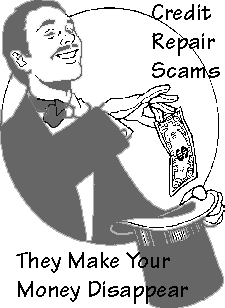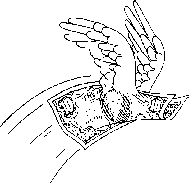Credit Repair Scams
They Make Your Money Disappear
An illustrated fact sheet that describes what a credit report is and how to find out what is in your credit report. Explains how to correct inaccurate information in your report and advises caution with credit repair companies and guaranteed credit claims.

Introduction
Some companies cheat consumers by making misleading claims about "cleaning up" bad credit reports. This brochure explains the limited services that credit repair companies can legally perform, and reveals some companies' misleading claims and illegal practices.
What is a credit report?
Your credit report is a listing of your payment history on credit cards and loans, including your mortgage. It includes information about outstanding loans, debt repayment and credit limits. It may also include non-credit information, such as jobs you have held, public record information, your date of birth and your address.
Your credit report is reviewed by lenders when you apply to them for credit. They use the report's information in deciding whether to give you a loan. Credit reports are maintained by credit reporting agencies. These private companies work with banks and other lenders. The three biggest national credit reporting agencies are Experian, Trans Union and Equifax.
If you have ever fallen behind in making payments on loans or on your credit cards, it may be difficult for you to get a new loan, an apartment or even a job. Most negative information—including information about federally-guaranteed student loans—stays on the report for seven years after it was reported; bankruptcies stay on for 10 years.
It also is possible that incorrect information may be in your credit report. For instance, your credit report might contain a statement that you failed to pay a debt that you did pay, information about another person with the same name, or a court action you were not involved in.
How do I find out what's in my credit report?
You can obtain a copy of your credit report from any or all of the three major credit reporting bureaus.
The three largest credit reporting bureaus are: Equifax - 1-800-685-1111, Experian - 1-888-EXPERIAN (397-3742), Trans Union - 1-800-916-8800.
Credit reporting bureaus may charge you up to $8 to get a copy. However, a bureau must give you a free copy if you have been turned down for credit, a job, insurance or a rental unit within the last 60 days because of information in its report. The company turning you down must tell you which of the bureaus furnished the report it used.
What can I do about inaccurate information in my credit report?
You have the right to ask a credit reporting bureau to verify information in your credit report that you believe is inaccurate. Also, contact the company that gave the information to the credit reporting bureau and ask it to provide corrected information to all credit reporting bureaus it works with.
Inaccurate information about you may be on more than one credit report. You should write to each credit reporting bureau to make sure the error is corrected on all your credit reports. About two months after you think the error should have been corrected, order copies of your credit reports again to check that the inaccurate information was deleted.
You may also write a statement of 100 words or less to present your version of the situation and ask the credit reporting bureau to include it in your credit report.

Beware of companies that say they can repair your credit!
So-called "credit repair" companies place ads in magazines, newspapers and on the Internet claiming that they can remove negative information from credit reports. The ads usually carry a version of this message: "Turned down because of bad credit? We can help!" These companies call themselves "Credit Advisors," "Credit Rating Correction Services" or "Credit Consultants." Many of these companies charge hundreds if not thousands of dollars to "clean up" bad credit reports. But the truth is, these companies can only do what you could do yourself—at no charge.
Nobody can remove negative information that is accurate from your credit report. No company has a "secret" ability to remove negative information.
But this doesn't stop these companies' claims. This deceptive quote is from a credit repair company brochure: "Charged-off accounts, collection accounts, judgments, tax liens, repossessions, and even bankruptcies can be removed from your credit records in less than one year (five to seven month average)."
One tactic is to bombard credit reporting agencies with requests to verify information. If a credit reporting agency cannot verify an entry within 60 days, it will remove the information from the report. But if the information is later verified to be accurate, it will go back in the report.
Before you even consider signing a contract with a company that promises to repair your credit, remember these facts:
- You may obtain a copy of your credit report on your own.
- You have the right to dispute entries in your credit report.
In any case, credit repair companies are prohibited under federal law from collecting any payment from you until after you get an amended copy of your credit report.
Don't fall for offers that guarantee to get you credit!
Credit repair and other companies often claim they "guarantee" to get you a credit card, regardless of your credit history. In fact, these companies do not always honor their guarantees. Sometimes, they'll just take your money and run—you will not get any credit, regardless of what they promised.
If they get you a card at all it often will be a "secured" bank credit card with high up-front "application" fees that requires you to deposit and keep several hundred dollars in a savings account, or a card that only allows you to buy items in a catalogue from a business that you probably never heard of. You can apply for a secured credit card by yourself. To find banks that do not charge application fees for secured cards, check the BankRate web site (www.bankrate.com).
Credit repair companies often advertise on television, in newspapers and even on match-books. Sometimes they require consumers to dial a "900" telephone number to get more information. Calls to 900 numbers cost several dollars per minute, so listening to a few minutes of information about the cards will result in a hefty charge on your phone bill.
Some companies try to get people a credit card by having them apply using financial information of other people with good credit histories. It is a criminal act to apply for credit under someone else's name—do not do business with these companies.
Law enforcement agencies have shut down many credit repair outfits, but it is hard to stop a fraudulent credit repair business unless people complain about it. Therefore, be careful about responding to credit repair ads and be sure to complain to the agencies listed below if you think a credit repair company took advantage of you or if you see suspicious ads or web sites offering to fix your credit.
Where can I get help?
The Federal Trade Commission (FTC) publishes information for consumers on the subject of credit and enforces federal laws on credit. For a list of free publications, call (877) FTC-HELP. While the FTC does not handle individual cases, it can act when it sees a developing pattern of possible law violations. Complaints about credit reporting agencies and credit repair scams must be in writing. Send them to: FTC Credit Practices Division, 6th St., N.W., Washington, DC 20580. Web site: www.ftc.gov

Contact your local consumer protection agency or your state Attorney General's office. Many Attorneys General have toll-free consumer hotlines. These numbers may be listed in the government section in the front of your phone book. These agencies can offer you advice and may also be able to help you resolve your complaint. You also can find your Attorney General's address and phone number online at the National Association of Attorneys General web site (www.naag.org).
Consumer Action, a non-profit education and advocacy organization, has a free hotline that provides non-legal consumer advice and referrals to complaint-handling agencies. Call either 1-415-777-9635 (San Francisco office) or 1-213-624-8327 (Los Angeles office) and leave a message and a staff member will return your call. Chinese, English and Spanish are spoken. You may also e-mail complaints to us at [email protected]. Web site: www.consumer-action.org
The Consumer Credit Counseling Service (CCCS) assists consumers who have problems in paying their bills—before their good credit ratings suffer. Your local CCCS office can help you work out flexible payment plans to make debt repayment more feasible. Call 1-800-388-CCCS for an interactive recording that will provideyou with the phone number of the office nearest to you.
Created by Consumer Action with funding from Bank of America Consumer Education Fund
Published / Reviewed Date
Published: December 27, 2000
Download PDF
No Download Available
Sponsors
BACEF
Filed Under
Credit ♦ Credit Reports/Scores ♦ Fraud/Scams ♦
Copyright
© 2000 –2024 Consumer Action. Rights Reserved.



